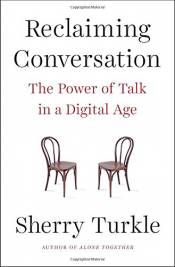
Reclaiming Conversation
Pages: 448
Edition: Hardcover
List Price: $27.95
Publisher: Penguin Press
ISBN: 9781594205552
First entered: 10
Number of weeks: 1
Book Summary
Renowned media scholar Sherry Turkle investigates how a flight from conversation undermines our relationships, creativity, and productivity—and why reclaiming face-to-face conversation can help us regain lost ground.We live in a technological universe in which we are always communicating. And yet we have sacrificed conversation for mere connection.
Preeminent author and researcher Sherry Turkle has been studying digital culture for over thirty years. Long an enthusiast for its possibilities, here she investigates a troubling consequence: at work, at home, in politics, and in love, we find ways around conversation, tempted by the possibilities of a text or an email in which we don’t have to look, listen, or reveal ourselves.
We develop a taste for what mere connection offers. The dinner table falls silent as children compete with phones for their parents’ attention. Friends learn strategies to keep conversations going when only a few people are looking up from their phones. At work, we retreat to our screens although it is conversation at the water cooler that increases not only productivity but commitment to work. Online, we only want to share opinions that our followers will agree with – a politics that shies away from the real conflicts and solutions of the public square.
The case for conversation begins with the necessary conversations of solitude and self-reflection. They are endangered: these days, always connected, we see loneliness as a problem that technology should solve. Afraid of being alone, we rely on other people to give us a sense of ourselves, and our capacity for empathy and relationship suffers. We see the costs of the flight from conversation everywhere: conversation is the cornerstone for democracy and in business it is good for the bottom line. In the private sphere, it builds empathy, friendship, love, learning, and productivity.
But there is good news: we are resilient. Conversation cures.
Based on five years of research and interviews in homes, schools, and the workplace, Turkle argues that we have come to a better understanding of where our technology can and cannot take us and that the time is right to reclaim conversation. The most human—and humanizing—thing that we do.
The virtues of person-to-person conversation are timeless, and our most basic technology, talk, responds to our modern challenges. We have everything we need to start, we have each other.
Authors

Name: Sherry Turkle
About the author:
Sherry Turkle is Abby Rockefeller Mauzé Professor of the Social Studies of Science and Technology in the Program in Science, Technology, and Society at MIT and the founder (2001) and current director of the MIT Initiative on Technology and Self. Professor Turkle received a joint doctorate in sociology and personality psychology from Harvard University and is a licensed clinical psychologist.
Professor Turkle writes on the "subjective side" of people's relationships with technology, especially computers. She is an expert on mobile technology, social networking, and sociable robotics. Profiles of Professor Turkle have appeared in such publications as The New York Times, Scientific American, and Wired Magazine. She has been named "woman of the year" by Ms. Magazine and among the "forty under forty" who are changing the nation by Esquire Magazine. She is a featured media commentator on the social and psychological effects of technology for CBS, NBC, ABC, CNN, the BBC, and NPR, including appearances on such programs as Nightline, Frontline, 20/20, and The Colbert Report.